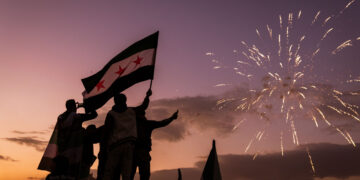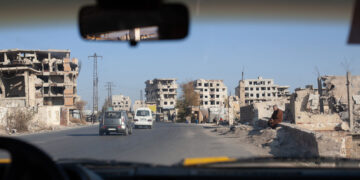Mia Swart is a visiting professor in the School of Law at the University of the Witwatersrand, in Johannesburg, South Africa.
It has been said that the bigger the crime, the less likely it is that it will be prosecuted. This is the case not only for war crimes and genocide, but also for the crime of apartheid under international law. While the term apartheid was created to describe the legalized racial segregation that existed in South Africa for much of the latter half of the 20th century, apartheid has been recognized as a crime against humanity in both the 1973 International Convention on the Suppression and Punishment of the Crime of Apartheid, known as the Apartheid Convention, and the 1998 Rome Statute of the International Criminal Court.
Yet there still has not been a single successful prosecution of the crime of apartheid in post-apartheid South Africa. Until recently, nobody was even charged with the crime of apartheid in the handful of apartheid-era cases that landed in South African courts after the country's transition to democracy in 1994. But after a long line of missed opportunities, apartheid has finally made it onto the charge sheet in a court in South Africa, in what is known as the Cosas Four case, raising a glimmer of hope for justice. It follows the re-opening in recent years of several apartheid-era cases involving the deaths of anti-apartheid activists.
The case involves four young men who, in the early 1980s, became known as the Cosas Four. Eustice Madikela, Ntshingo Mataboge, Zandisile Musi and Fanyana Nhlapo were young student members of the anti-apartheid Congress of South African Students, or Cosas, all from Kagiso, a township west of Johannesburg. On Feb. 15, 1982, they were lured to a pump house at a disused mine in the nearby city of Krugersdorp by an informer, Ephraim Mfalapitsa, who worked for the Security Branch of the South African police. Mfalapitsa told them that they would receive training there on how to use certain weapons against the apartheid government. But the South African police had, in fact, filled the pump house with explosives. The four students were locked inside and, once Mfapalitsa left, the explosives were detonated, killing Madikela, Mataboge and Nhlapo, and heavily injuring Musi.
The families of the victims were told by the police that the students had blown themselves up. Although it was clear that they died from unnatural causes, Madikela, Mataboge and Nhlapo were all buried without a post-mortem examination or any police investigation or government inquiry. Musi died of COVID-19 complications in 2021.
It has been said that the bigger the crime, the less likely it is that it will be prosecuted. This is the case not only for war crimes and genocide, but also for the crime of apartheid under international law.
- Mia Swart
Following the end of apartheid in 1994 and the establishment of South Africa's Truth and Reconciliation Commission, the perpetrators of the Cosas Four killings applied for amnesty, like others implicated in many apartheid-era crimes and abuses. Besides Mfalaipitsa, the perpetrators included four Security Branch officers: Christiaan Rorich, Frederik Schoon, Abraham Grobbelaar and Carel Coetzee. The commission refused to grant them amnesty, referring the case to the newly formed National Prosecuting Authority for further action. The understanding was that apartheid-era perpetrators who did not receive amnesty would be prosecuted.
But for almost 20 years, the National Prosecuting Authority refused to act on the case. According to human rights lawyer Howard Varney, an expert at the International Center for Transitional Justice who has represented many of the families of deceased anti-apartheid activists, this neglect was attributable to political interference. "The TRC made adverse findings against all the main role players, including the ANC," Varney told me in 2020, referring to the ruling African National Congress that has governed South Africa since the end of apartheid. "The ANC did not want these cases pursued to protect its own."
Varney cited Jackie Selebi, South Africa's first black national police commissioner, serving from 2000 to 2008, and a prominent member of the ANC, who reportedly told Vusi Pikoli, then the head of the National Prosecuting Authority, "If you go after the apartheid generals, then you open the door to cases against us." By that, he meant cases against the ANC for its armed struggle, including guerrilla warfare, against South Africa's apartheid-era government.
"That was not acceptable," Varney said. "So, to the ANC, the solution was to stop all cases."
In a revised indictment in 2021, the two surviving men accused of involvement in the Cosas Four killings, Rorich and Mfalapitsa, were charged with kidnapping and the crimes against humanity of murder and apartheid. Prosecutors alleged that Rorich and Mfalapitsa unlawfully and intentionally killed the student activists as part of a systematic, state-led campaign to eliminate political opponents of the apartheid regime. They charged that the accused killed the students as part of an institutionalized regime of systematic oppression and domination by one racial group over another with the intention of maintaining that domination.
The case is currently being delayed by the South African Police Service, which has been ordered by the court to pay Rorich's legal costs but has refused to do so.
Activists for Palestinian rights could learn much from the case. Over the past two years, leading human rights organizations have categorized the situation in Israel and the occupied Palestinian territories as meeting the definition of apartheid under international law. Both Amnesty International and Human Rights Watch issued detailed and damning reports in the last year describing the multiple ways in which Israel's control over Palestinians constitutes an apartheid regime—"a system of oppression and domination against the Palestinian people wherever it has control over their rights," according to Amnesty, and "an overarching Israeli government policy to maintain the domination by Jewish Israelis over Palestinians and grave abuses committed against Palestinians living in the occupied territory, including East Jerusalem," according to Human Rights Watch.
South Africa is a cautionary tale for not being too optimistic about prosecuting the crime of apartheid; even in fairly clear cases of apartheid, activists will face significant political and legal pitfalls.
Christopher Gevers, a professor at the School of Law at the University of KwaZulu-Natal, has written of a "commitment" on the part of the South African government not to prosecute apartheid. In the years leading up to South Africa's democratic transition in 1994, anti-apartheid leaders did not consider the criminalization of apartheid to be a necessary or integral feature of transitional justice. In the spirit of the forgiveness embodied by Nelson Mandela and Desmond Tutu, South Africa shifted the focus from prosecution to amnesty. Even though the Truth and Reconciliation Commission found that apartheid, as a form of systematic racial discrimination and separation, constituted a crime against humanity, and that between 1960 and 1994, the South African government and its security forces were the primary perpetrators, the commission became known for its conditional amnesty scheme. This meant that perpetrators received amnesty in exchange for making full disclosure of the crimes they committed during apartheid. The conditional amnesty scheme was one reason why apartheid was never prosecuted. The ANC government's lack of political will to prosecute apartheid was another.
South Africa is a cautionary tale for not being too optimistic about prosecuting the crime of apartheid; even in fairly clear cases of apartheid, activists will face significant political and legal pitfalls.
- Mia Swart
South Africa did advocate for the inclusion of the crime of apartheid in the 1998 Rome Statute of the ICC. Largely as a result of the efforts of the South African delegation in Rome, apartheid was included in the text at the eleventh hour. However, the non-retroactivity of the Rome Statute meant that none of the crimes committed during apartheid in South Africa would ever be prosecuted by the ICC. As Gevers wrote, "It would seem the time is never right to prosecute certain crimes. Or, put differently, the time is always right to never prosecute such crimes."
In 2005, there was some hope for accountability when South Africa's Constitutional Court ruled that a high-profile case against the former head of the apartheid government's secret biological and chemical program could be reopened. Wouter Basson, dubbed "Dr. Death" in the South African media, had been acquitted of all charges in 2002, including accusations of plots to poison anti-apartheid activists, including Nelson Mandela. The judge in his trial had ruled that the charges against Basson fell outside South African law because they involved crimes allegedly committed outside the country. In its 2005 ruling, the Constitutional Court dismissed that reasoning and acknowledged that "international law obliges South Africa to punish crimes against humanity and war crimes," and that "the practice of apartheid constituted crimes against humanity." Yet in the years since, the National Prosecuting Authority has not started any proceedings against Basson for crimes against humanity.
The ANC's attitude toward apartheid seems schizophrenic, and its political rhetoric has often failed to translate into legal action. Apartheid is regularly invoked by the ANC domestically and largely guides its foreign policy—most prominently in its approach toward the Israel-Palestine conflict. The ANC has positioned itself as a staunch supporter of Palestinian self-determination, while prominent anti-apartheid activists and party leaders have made analogies between South African apartheid and Israel's occupation of Palestinian territory. But this is also deeply contradicted by South Africa's inability to prosecute apartheid as a crime in its own courts, which has implications beyond South Africa. The National Prosecuting Authority's long failure to bring charges for the crime of apartheid has demoralized Palestinians and other advocates who see the reality of apartheid under Israeli rule. Finally prosecuting the crime of apartheid in South Africa would set a much-needed legal precedent for those seeking justice for the crime of apartheid against Palestinians.
The tide may slowly be turning. In addition to the Cosas Four case, another case is set to start in South Africa in early 2023, involving another Cosas member—a young student activist named Caiphus Nyoka, who was shot and killed in 1987 by four police officers who broke down the door to his parent's house in the middle of the night and executed him. Following the example of the Cosas Four case, the National Prosecuting Authority may again decide to add the crime against humanity of apartheid to the charges against the officers. If so, it would mean that after decades of inaction and impunity, there might soon be two groundbreaking cases in South Africa that can be used as legal precedent in other situations of apartheid today. It is about time the crime of apartheid leaves the realm of legal theory and gets tested in the courts.





































